<Back to Index>
- 10th Chancellor of Germany Philipp Scheidemann, 1865
- 11th Chancellor of Germany Gustav Adolf Bauer, 1870
PAGE SPONSOR
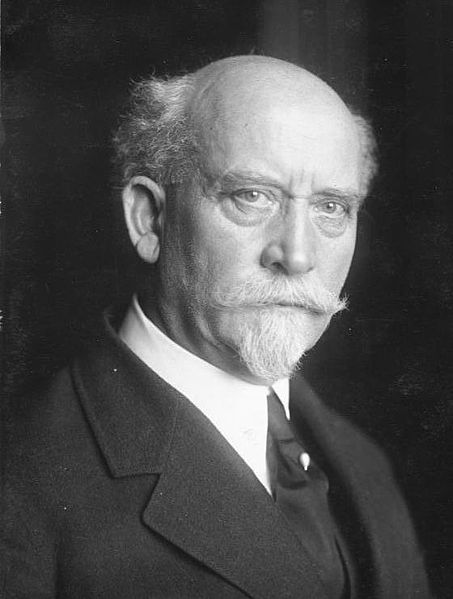
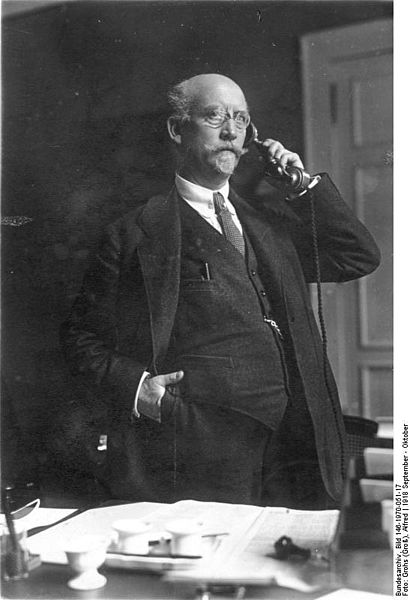
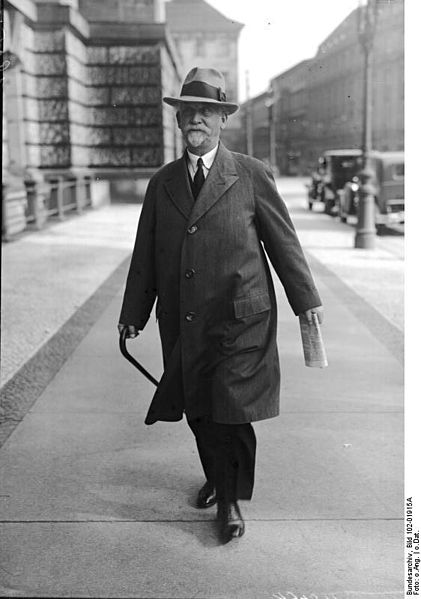
Philipp Scheidemann (26 July 1865 - 29 November 1939) was a German politician of the Social Democratic Party of Germany (SPD). During the German Revolution of 1918 - 1919 he proclaimed Germany a republic on 9 November 1918 and subsequently became the second Chancellor of the Weimar Republic, acting in this post for 127 days.
Born in Kassel, Scheidemann, from a modest artisan background, attended middle school and did an apprenticeship as a printer. He joined the SPD in 1883, in protest against Chancellor Otto von Bismarck's Anti - Socialist Laws. A member of the Free Trade Union, he worked in Marburg, where he attended lectures in philosophy at the university held by Hermann Cohen. In 1895 he took to editing Social Democratic newspapers, first at Giessen and afterwards successively at Nuremberg, Offenbach, and again in Kassel.
Upon the 1903 federal election, Scheidemann became a member of the Reichstag parliament, delegated from the Solingen district for the Social Democrats, and soon rose to be one of the principal leaders of the party. In 1911 he was elected a member of the executive committee and two years later succeeded August Bebel as chairman of the SPD parliamentary group together with Hugo Haase. An eloquent and witty orator, he and the grave party chairman Friedrich Ebert complemented each other. During the early years of his career, Scheidemann, actually a pragmatic politician, was regarded as a left wing exponent. His vitriolic rhetoric once made Chancellor Theobald von Bethmann - Hollweg leave the Reichstag debate chamber in protest. A speech held in Paris in 1912, on the eve of World War I, earned him the libel of a traitor of his country.
After the outbreak of the war in 1914 however, Scheidemann, along with Ebert was leader of the majority faction of the party, which continued to vote for war bonds, limiting his opposition to the war to urging the negotiation of a compromise peace without annexations. His declarations were nevertheless branded as "high treason" by nationalist circles. On the other hand, Scheidemann's utterances forwarded the break up with the left wing Social Democrats led by Karl Liebknecht, leading to the establishment of the Independent Social Democratic Party of Germany (USPD) in 1917. In turn, Scheidemann approached to Progressive and Center Party MPs to pass the Reichstag Peace Resolution, though to no avail.
In June 1918, Scheidemann was elected vice president of the Reichstag. After the resignation of Georg von Hertling's government, the Social Democrats were for the first time included in the German cabinet of the new Chancellor Prince Max of Baden in October 1918. Scheidemann, who initially had opposed the Prince's appointment recommended by the Progressive Party, entered the government as a minister without portfolio. In his office, he achieved an amnesty to all political prisoners and especially the release of his convicted former party fellow Karl Liebknecht.
Following the abdication of Kaiser Wilhelm II on November 9, Prince Max resigned in favor of Ebert. The new government intended to leave the question of whether to retain the monarchy in the hands of the people, though it preferred to turn Germany into a constitutional monarchy in the person of one of the Kaiser's grandsons. Hours after the Kaiser abdicated, Scheidemann, concerned in the face of a possible workers' revolution in Berlin, gave a speech from the balcony in the Reichstag building. He closed his speech with the following words:
The old and rotten, the monarchy has collapsed. The new may live. Long live the German Republic!"
The timing of this proclamation was probably due to the expectation of a similar proclamation of a "Workers' Republic" by the communists led by Karl Liebknecht, which indeed followed a couple hours later.
Scheidemann continued to serve as a leader in the Provisional Government which followed for the next several months, and following the meeting of the National Assembly in Weimar in February 1919, Ebert was appointed Reich President, and Scheidemann became Chancellor, in the Weimar Coalition with the German Democratic Party and the Catholic Center Party. Scheidemann resigned in June along with the DDP owing to disagreement with the Treaty of Versailles, and never again served in the government, although he remained active in politics, serving as Mayor of Kassel (1920 - 1925), and then again as a Reichstag delegate, where he exposed military opposition to the Republic.
Scheidemann went into exile following the Nazi Machtergreifung in 1933, and died in Denmark shortly after the outbreak of the World War II. The Copenhagen Municipality left his ashes to Kassel in 1953.
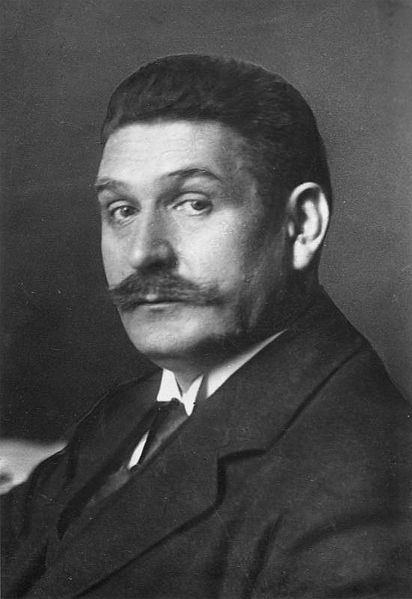
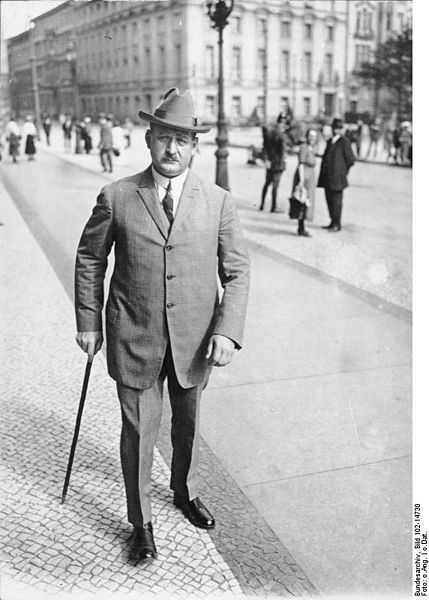
Gustav Adolf Bauer (6 January 1870 - 16 September 1944) was a German Social Democratic Party leader and the chancellor of Germany from June 1919 to March 1920. He served as head of government for nine months. Prior to becoming head of government, Bauer had been Minister of Labor in the first democratically elected German cabinet. After his cabinet was brought down by the Kapp Putsch in March 1920, Bauer served as vice chancellor, Minister of the Treasury, and Minister of Transportation in other cabinets of the Weimar Republic from May 1920 to November 1922. In 1924 and 1925 he was involved in the Barmat scandal.
Bauer was born on 6 January 1870 in Darkehmen, near Königsberg in the Province of Prussia (now Ozyorsk, Kaliningrad Oblast, Russia) as the son of bailiff Gustav Bauer and his wife Henriette (née Groß). From 1876 to 1884, he attended the Volksschule in Königsberg. After 1884, he worked as a clerk and later head clerk for a lawyer at Königsberg.
In 1895, he became president of the Union of Office Employees of Germany, a white collar union that he co-founded. He also was editor of the publication Der Büroangestellte ("The Office Worker") and in 1903 was named head of the Zentral - Arbeiter - Sekretariat der Freien Gewerkschaften in Berlin ("Central Secretary of Independent Unions"). In 1908, Bauer became second chairman of the Generalkommission der Gewerkschaften (General Commission of Trade Unions) in Berlin, a position he kept until 1918.
On 2 October 1911, Bauer married Hedwig Moch.
In 1912, Bauer was elected to the Reichstag for the
Social Democratic Party of Germany (SPD) in a Breslau constituency. In
October 1918, Bauer became Secretary of State at the Reichsarbeitsamt
(Labour) in Max von Baden's
cabinet. Bauer remained
in this position throughout the revolution of 1918/19.
After Max von Baden resigned in November 1918, Bauer
continued to serve under Reichskanzler Friedrich
Ebert and then under the Council of the People's Deputies,
also headed by Ebert. While serving as Minister of Labor,
Bauer introduced the Factory Constitution Law and issued a
number of decrees, including universal voting rights for
those aged 20 and above in all types of elections,
regulated wage agreements, protection from arbitrary
dismissal with appeal as a right, the re-installment of
demobilized workers, a national health insurance, local
municipality social welfare (split between the states and
government), the right of civil-service associations,
agricultural labor reform, domestic labor reforms, and the
eight hour workday.
In January 1919, Bauer was elected to the National Assembly for Magdeburg. In February, he became Minister of Labor in Philipp Scheidemann's cabinet. After Scheidemann resigned in June 1919 as a protest against the Treaty of Versailles, Bauer succeeded him as Reichsministerpräsident, heading the Bauer cabinet. His government signed the Treaty. When the Weimar Constitution came into force in August 1919, Bauer became Reichskanzler (Chancellor). Bauer's time as Chancellor witnessed the passage of the Reich Settlement Law of August 1919, which redistributed large estates among smaller farmers, although only 3% of small-scale farmers had benefited from this law by 1928. The Allotment Garden and Small Lease Holding Ordinance of July 1919 provided legal protection for non-commercially used property such as workers' gardens and "Schreber" gardens. In October 1919, a law came into force that entitled insured women to a lump sum of 50 marks from their insurance board to cover the cost of childbirth, together with confinement compensation for 10 weeks. In addition, maternity care was covered by a 25 mark payment and a daily breastfeeding bonus of one mark fifty for 10 weeks. This law also entitled the wives and daughters of insured employees (both female and male) to certain types of support in connection with pregnancy. Following a similar decree issued in December 1918, an important decree was issued in support of Jugendpflege (youth welfare) in November 1919.
Various improvements to unemployment benefits were also carried out during Bauer's time as chancellor. A winter supplement was provided in October 1919, and certain modifications were carried out in January 1920. In addition, the maximum benefit for single males over the age of 21 was increased from three and a half to six marks in February 1920. A decree of October 1919, however, ordered all Reich unemployment relief funds to be withdrawn from those municipal authorities that went beyond the maximum scales.
In the field of sickness insurance, a decree of 28 June 1919 bestowed upon rural funds the same right of self government that other funds had. An order of 27 October 1919 empowered the Reich Minister of Labor to encourage through grants and loans "measures which were estimated to create opportunities for employment". In December 1919, laws were passed that extended compulsory insurance against infirmity and old age to certain new classes of workers. The Betriebsrätegesetz (Factory Council Act) of February 1920 established works councils at workplaces with 20 or more on the payroll as a means of improving lines of communication between labor and management. In addition, a series of progressive tax reforms were implemented under the auspices of finance minister Matthias Erzberger, such as the Reich Revenue Law of July 1919, which gave the Reich sole authority for levying and administering taxes, the levying of war taxes on income and wealth as well as inheritance taxation in July 1919, and a one-off wealth tax in December 1919.
In March 1920, the Kapp - Lüttwitz Putsch attempted to depose the government. Bauer, along with other SPD members of the cabinet and president Ebert, signed a call for a general strike against the putsch. Most of the cabinet left Berlin for Dresden, then Stuttgart. However, some ministers remained in the capital and, led by vice-chancellor Eugen Schiffer negotiated with the putschists. Once the putsch had collapsed, the Bauer government was forced to resign on 27 March - mostly as a result of the negotiations conducted with Kapp and his fellow conspirators. Bauer was succeeded as chancellor by Hermann Müller (also SPD).
However, Bauer joined the new cabinet as Minister of the Treasury, a position he held until June 1920. From May to June 1920, Bauer was also Minister of Transportation. In the Reichstag elections of June 1920, he was reelected to parliament. However, the new government formed on 25 June excluded the SPD.
Bauer rejoined the cabinet of Joseph Wirth in May 1921 as Minister of the Treasury and vice chancellor. He held those positions throughout the term of office of Wirth (until November 1922). Throughout this time, Bauer was also a member of the Reichstag for Magdeburg and he retained his seat after leaving the government. However, in November 1924 he became involved in the Barmat scandal due to a personal relationship with the accused, Julius Barmat. On 7 February 1925, he was forced by the SPD parliamentary group to relinquish his seat in the Reichstag and on 14 February was expelled from the party.
Yet on 14 May 1926, Bauer's expulsion was overturned by
the party. He returned to the Reichstag until 1928, when
he left parliament and retired from public life.
After the Nazi Party took power in 1933, Bauer was arrested on 29 June 1933. He was supposed to have misappropriated public funds. However, the charge was based on alleged statements made by his son in school. When it turned out that Bauer's marriage was childless and there was in fact no son, he was released after a week of custody. The lawsuit was dismissed only in 1935, however.
Bauer died in Hersdorf (Berlin Reinickendorf) on 16 September 1944.